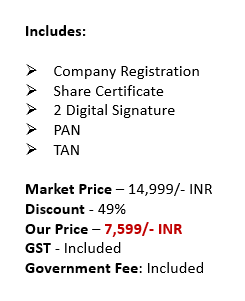- Home
- Income Tax
- GST
- Registration
- Sole Proprietorship Registration
- Section 8 Company
- Partnership Firm Registration
- Nidhi Company Registration
- Private Limited Company Registration
- Trust Registration
- One Person Company Registration (OPC)
- Hindu Undivided Family (HUF)
- Limited Liability Partnership (LLP)
- PF Registration
- Professional Tax
- Digital Signature
- FSSAI Registration
- TAN Application
- Import Export Code (IEC)
- PAN Application
- MSME Registration
- Start Up India Registration
- Professional Tax
- Accounting
- Blog
- Basic
Enquire Us
Private Limited Company
A private limited company (Ltd) is a type of business structure that offers limited liability to its owners and shareholders. A Private Limited Company is a legal entity separate from its owners, characterized by a limited number of shareholders (usually up to 50), restricted transferability of shares, and limitations on public offerings.
A Private Limited Company offers a blend of limited liability protection, access to capital, and an enhanced reputation, making it an attractive choice for entrepreneurs and small to medium-sized businesses. However, the regulatory and compliance requirements may be more stringent compared to other business structures. It is essential to evaluate the specific needs and goals of the business before opting for this type of company formation.
Types of private limited companies
There are several types of Private Limited Companies, each catering to different needs and purposes. Here are some common types:
- Private Company Limited by Shares: This is the most common type of private limited company. In this structure, the shareholders’ liability is limited to the amount unpaid on their shares. The company’s profits are distributed among the shareholders in the form of dividends.
- Private Company Limited by Guarantee: In this type of company, the members’ liability is limited to a pre-determined amount, which they agree to contribute in case of the company’s liquidation. This structure is commonly used by non-profit organizations, clubs, and associations.
- Unlimited Private Company: In this rare type of private limited company, there is no limit on the shareholders’ liability. This means that shareholders are personally responsible for the company’s debts and obligations, similar to a partnership structure. However, the company still enjoys separate legal status and other advantages of a private limited company.
- Exempt Private Company (EPC): This type of private limited company has a smaller number of shareholders (usually up to 20) and does not have any corporate shareholders. EPCs may enjoy certain exemptions from regulatory requirements, such as reduced financial reporting and disclosure obligations.
- Small Company: In some jurisdictions, a “small company” is a specific category of private limited company that meets certain size criteria (e.g., annual revenue, total assets, or number of employees). These companies may be subject to less stringent reporting and compliance requirements.
- Subsidiary Company: A subsidiary company is a private limited company that is wholly or partially owned by another company (parent company). The subsidiary operates as a separate legal entity but is controlled by the parent company through ownership of shares, management, or other means.
- Dormant Company: A dormant company is a private limited company that has not engaged in any business activities or transactions for an extended period. These companies may have reduced compliance and reporting requirements, as they do not generate any income or incur expenses during the dormant period.
It is important to note that the specific types of private limited companies and their characteristics may vary depending on the jurisdiction and local laws. Always consult with a legal expert or business advisor to understand the best-suited company type for your specific needs and objectives.
What Is The Procedure For Forming A Private Limited Company In India?
Here’s a brief overview of the procedure for forming a Private Limited Company in India:
- Obtain a Digital Signature Certificate (DSC)
- Apply for a Director Identification Number (DIN)
- Reserve a unique company name
- Prepare incorporation documents
- File for incorporation
- Obtain a Certificate of Incorporation:
- Apply for a Permanent Account Number (PAN) and Tax Deduction and Collection Account Number (TAN)
- Open a company bank account
- Register for Goods and Services Tax (GST).
- Obtain necessary permits and licences
Advantages Of Private Limited Companies
Private Limited Companies offer several advantages for business owners, including:
- Limited Liability: Shareholders’ liability is limited to the amount they have invested in the company. This protects personal assets from being used to settle company debts or obligations.
- Separate Legal Entity: A Private Limited Company is a separate legal entity from its owners, allowing it to enter into contracts, own property, and sue or be sued in its name.
- Easier Access to Capital: Although Private Limited Companies cannot raise funds through public offerings, they can still access capital through private investors, venture capitalists, and financial institutions.
- Continuity of Existence: A Private Limited Company has perpetual succession, meaning it continues to exist even in the event of the death, insolvency, or resignation of its shareholders or directors.
- Enhanced Credibility: Incorporating as a Private Limited Company can enhance the credibility and reputation of the business, making it easier to attract customers, partners, and investors.
- Ownership and Control: Private Limited Companies often have a smaller number of shareholders, enabling them to retain greater control over the business’s management and decision-making.
- Tax Benefits: Depending on the jurisdiction, Private Limited Companies may be eligible for certain tax benefits or incentives.
- Transferability of Shares: Although there are restrictions on share transferability in a Private Limited Company, it still allows for the transfer of ownership through the sale or gifting of shares.
- Protection of Minority Shareholders: Private Limited Companies often have provisions in place to protect the rights and interests of minority shareholders.
- Exit Strategy: A Private Limited Company can be sold, merged, or listed on a stock exchange (subject to meeting specific criteria), providing an exit strategy for the owners.
Documents Needed For Setting Up Private Limited Companies
Setting up a private limited company requires the submission of certain essential documents to the relevant regulatory authorities. This comprehensive list of required documents ensures that the business complies with local laws and regulations. The following sections outline the key documents needed for setting up a private limited company
Company Name Reservation:
- Proposed Company Name Form
- Business activity description
- Fee payment receipt for company name reservation
Memorandum of Association (MoA):
- Company name
- Registered office address
- Objectives of the company
- Liability of members
- Authorized share capital
- Subscriber details
- Signature of subscribers
Articles of Association (AoA):
- Company name
- Internal management rules
- Rights, duties, and responsibilities of company members
- Provisions for board meetings and general meetings
- Dividend distribution process
- Procedure for share allotment and transfer
- Signature of subscribers
Director Identification Number (DIN):
- Director’s full name
- Date of birth
- Nationality
- PAN card (for Indian nationals)
- Passport (for foreign nationals)
- Mobile number and email address
- Proof of residence
- Passport-sized photograph
Digital Signature Certificate (DSC):
- Duly filled application form
- Self-attested copy of PAN card
- Self-attested copy of address proof
- Passport-sized photograph
- Signature on the application form
Incorporation Application:
- SPICe+ Form (Simplified Proforma for Incorporating a Company Electronically)
- e-Memorandum of Association (e-MoA)
- e-Articles of Association (e-AoA)
- Declaration by the first directors and subscribers
- Proof of registered office address
- Consent to act as a director
- Fee payment receipt for incorporation application
Registration with Tax Authorities:
- Application for Permanent Account Number (PAN)
- Application for Tax Deduction and Collection Account Number (TAN)
- Goods and Services Tax (GST) registration
- Professional Tax registration (if applicable)
- Employee State Insurance (ESI) registration (if applicable)
Difference Between Ltd And Pvt Ltd Company
Attributes | Limited (LTD) Company | Private Limited (Pvt LTD) Company |
Legal Entity | Separate legal entity | Separate legal entity |
Shareholders | Public and private shareholders | Private shareholders only |
Minimum Shareholders | Varies by jurisdiction | Usually 2 |
Maximum Shareholders | Unlimited | Usually up to 50 |
Share Transferability | Freely transferable | Restricted transferability |
Shares Issuance | Public offerings allowed | No public offerings |
Name Suffix | Limited or LTD | Private Limited or Pvt LTD |
Compliance Requirements | More stringent | Less stringent compared to LTD |
Financial Reporting | Mandatory public disclosures | Limited public disclosures |
Corporate Governance | More extensive | Less extensive compared to LTD |
Liability of Shareholders | Limited to investment in shares | Limited to investment in shares |
Access to Capital | Easier through public offerings | Limited to private investors |
Dividend Distribution Tax (DDT) | Applicable | Applicable |
Related Guides
ITR Services
Other Services
Documents Required
- PAN Card
- Passport (Foreign Nationals Only)
- Aadhaar Card
- Foreign Government – Address Proof
- Bank Statement
- Latest Electricity Bill
- Latest Telephone Bill
- Latest Mobile Bill
- Board Resolution Authorising Investment
- Investing Company Address Proof
- Passport Size Photo
- Recent Utility Bill

